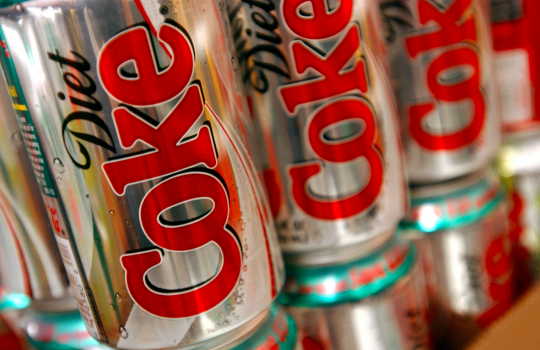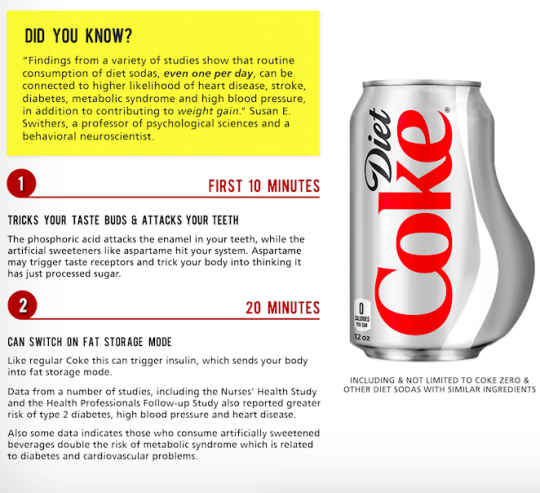What One Can of Diet Coke Does to Your Body in One Hour

Last week, an infographic on the effects that drinking a single can of Coke has on your body within 60 minutes went viral. Now, see the price your body pays for a can of Coke’s no-calorie, fake-sugar-sweetened counterpart, Diet Coke. (Photo: Corbis/Ramin Talaie)
Soda fans who want the fizzy drink without the extra calories have been turning to diet soda for years.
But recent research suggests that diet soda may have its own host of negative side effects, ranging from weight gain to Type 2 diabetes.
Now, a detailed new infographic fromTheRenegadePharmacist.com (creator of last week’s viral infographic detailing what happens to your body after drinking a Coke) breaks down what happens to your body after drinking a can of Diet Coke, Coke Zero, and other diet sodas with similar ingredients.


Here’s what you can expect:
In the first 10 minutes: The soda’s phosphoric acid attacks the enamel of your teeth, while artificial sweeteners like aspartame hit your system. The aspartame may trick your body into thinking it has just processed sugar.
In 20 minutes: The soda can trigger the production of insulin in your body, which sends your body into fat storage mode.

In 40 minutes: The combination of caffeine and aspartame creates a short, addictive high. Excitotoxins (a class of chemicals that overstimulate the brain’s neuron receptors) are released, which may exhaust your brain — especially if you drink diet soda on a regular basis.
In 60 minutes and beyond: Unlike the small amount of satisfaction you get from regular Coke, your body may still crave sweets. This makes you likely to reach for another soda or some other junk food, consuming extra calories in the process. The diet soda dehydrates your body, leading to brain fog, poor concentration, fatigue, and an irritable feeling.
While that information is daunting, certified dietitian-nutritionist Gina Keatley says you shouldn’t chuck your Diet Coke just yet, telling Yahoo Health that the infographic is “accurate, but misleading.”
For example, Keatley says it’s true that the phosphoric acid found in Diet Coke will erode your tooth enamel but points out that any acid strong enough to overcome the buffer your saliva provides will do this. “Many fruit juices have stronger acids and do more damage than a diet soda,” she says.
She also calls the claim about diet soda and dehydration “overstated.” While a can of soda will definitely dehydrate you, she says you will urinate at least 50 percent of that soda after a couple of hours, compared to 35 percent of a cup of water.
“You lose a significant amount of everything you drink, which is why you have to replenish the body with fluids every day,” she says. “But you don’t lose all the water in a cup of soda.”
The biggest danger in diet sodas is that they can become addictive and replace water consumption, certified dietitian-nutritionist Lisa Moskovitz, RD, CEO of NY Nutrition Group, tells Yahoo Health.
However, research has associated the artificial sweeteners found in Diet Coke and other diet sodas with increased risks of developing Type 2 diabetes, heart disease, and high blood pressure.
A rat study published last year in the journal Nature found that the sweetener aspartame, which is used in Diet Coke, promoted glucose intolerance in rats. (Glucose intolerance is linked to pre-diabetes and Type 2 diabetes.)
Other diet sodas aren’t off the hook, though: Research published in the journal Diabetes Care in 2013 found that when obese people were given the artificial sweetener sucralose (found in Diet Pepsi) to drink before taking a glucose challenge test, their blood sugar peaked at a higher level than when they drank only water before the test. Their insulin levels also rose by nearly 20 percent, which scientists say could lead to weight gain and Type 2 diabetes if it happens often (such as after repeatedly drinking some diet sodas).
Diet soda can also increase your waistline. A study published in the Journal of the American Geriatrics Society earlier this year found that people who drank diet soda gained almost three times the belly fat over the course of nine years as people who didn’t drink diet soda.
The public seems to be taking note: According to research conducted by market research company Euromonitor International, diet cola sales are expected to fall 30 percent between 2012 and 2017.
But if you can’t live without your diet soda fix, is it OK to have it in moderation? Experts say yes.
Adds Moskovitz: “There is nothing healthy or nutritious about diet drinks but, if it doesn’t exceed more than one can per day, then I don’t believe it will cause permanent harm or dehydration.”
Don't Kill yourself, the producer gain a profitable business with billion of dollars, while you suffer. just because of to enjoy
Don't Kill yourself, the producer gain a profitable business with billion of dollars, while you suffer. just because of to enjoy
No comments:
Post a Comment